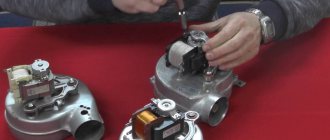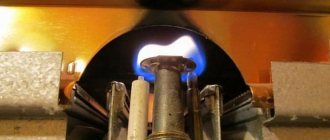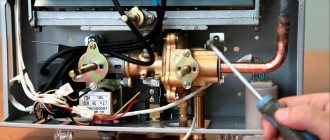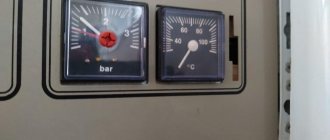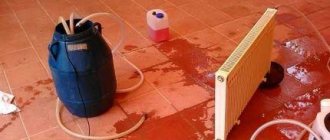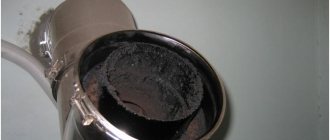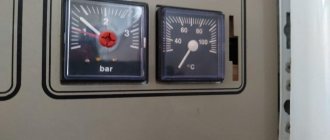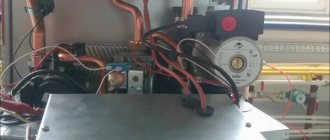We have a TERMO gas boiler, single-circuit 10 kW, made in Ukraine.
So, he worked, he worked, for 4 years. Everything was fine and in order. True, the factory thermocouple burned out in the second year, and I changed it, but that's a different story.
This fall, when it got cold, we started using it. But it started making loud popping noises when switching to low flame. Well, there is such an automation that when the water inside gets hot enough, in accordance with the temperature regulator, the boiler, to save money, turns off the gas supply to the main burner and only a small burner, the so-called igniter, remains burning.
Then, when the water cools down, the automation again begins to supply gas to the large burner. So, it was precisely when the boiler went into “sleep mode” that for some reason gas collected inside and then detonated. And for the entire time (5-10 minutes) everything was fine. And so every time.
I assumed that perhaps the boiler was dirty inside with soot. I decided to take it apart and clean it.
ATTENTION: Do not under any circumstances attempt to disassemble or repair gas equipment, as Is it dangerous . If problems arise, you must contact the gas service (104) and call a specialist.
My guess is that cravings have gotten worse.
I started with the chimney. I took apart the galvanized steel sockets and found nothing inside. As I expected, there was no soot there. I checked the traction. But everything was fine in the chimney: the match instantly went out when brought to the chimney. Then I looked into the boiler, it was also clean.
Then I moved on to the main block. Checked the injectors. But both injectors were clean and the holes were open. The burners were also clean.
During disassembly, I broke the large nozzle, because... it was conical and made of duralumin, and sat very tightly at the entrance to the lid plate. I had to replace it with a bronze analogue. But unfortunately I didn’t find one with a cone, so I had to additionally seal the entrance to the plate with tow. The seal is necessary so that it does not draw in air.
By the way, the diameter of the hole in the nozzle is very important . The diameter should be the same. It was smaller on the bronze nozzle and I drilled it out.
And, in the end, I found out the reason for the drop in traction. The draft in my boiler comes from the bottom of the boiler. The boiler has no bottom. But there was a net installed there. And over the course of 4 years, a dense layer of dust formed at the bottom of the mesh, just like felt.
The mesh is removed along the slide in which it sits. Then I vacuumed the mesh. And installed everything in place. Now the boiler does not slam.
Let me say it again: Do not attempt to make repairs yourself. Such work must be entrusted to a specialist. Gas leaks can have FATAL consequences.
Welcome to the De Dietrich Thermique forum!
#1 20-03-2013 14:34:28
Copper (mini explosion) when igniting
The boiler is 5 months old, in its first winter, I recently noticed that when ignited, the piezo crackles, the gas flow is clearly audible, sometimes it’s normal, and sometimes there’s a bang and it seems like the boiler will burst. what could it be? I didn’t notice this all winter, only when it started to get warmer outside, by the way I noticed that this mostly happens when the boiler temperature is 33-37 degrees (up to 40). I took off the combustion chamber cover and wiped the burners with a toothbrush, using a cloth, it seemed a little better, less often, but it still slammed.
Lack of draft in the chimney
As a rule, the presence of this reason leads to the fact that the column will go out during operation. It is very easy to detect: a lit match or stick must be brought to the viewing slot located on the front panel.
When everything is in order, the flame of the match is drawn inward, this is clearly visible to the naked eye. If the flame does not move, we proceed to the second stage: we disconnect the chimney pipe from the shaft opening and repeat the test by holding a match to this hole. No traction again? There may be two reasons:
- the vertical shaft is blocked by foreign objects or clogged with soot;
- in the room where the heater is located, there is no air flow, and without it there is no hood and the column goes out.
It must be said that the first reason occurs infrequently. And it cannot happen that the craving was there for many years, and then suddenly disappeared. Unless someone deliberately threw garbage into the mine. Soot on the inner walls grows gradually and makes itself felt by a slight decrease in draft, especially in the summer. But, before calling the stove workers to inspect the exhaust shaft, you need to make sure that fresh air is entering the room.
It happens that the instantaneous heater goes out when the old wooden windows in the house are replaced with metal-plastic ones. As a result, the air flow from the street is blocked and the draft disappears.
You can determine the lack of inflow this way: repeat the operation with a match with the window open. If a draft appears, you need to organize normal air exchange in the room, and don’t sit with the windows open all the time.
It also happens that there is draft in the shaft, but there is no draft at the viewing window of the column. This means that the reason lies in the gas-air path of the device. Typically, the heat exchanger fins clogged with soot practically do not allow air to pass through and the unit does not operate normally. And the last reason related to the chimney is the failure of the draft sensor. To replace it, as well as to clean the heat exchanger, it is better to invite a specialist.
#5 20-03-2013 20:13:38
Re: Pop (mini explosion) when igniting
1. Check the position of the electrode (gap: 3 mm) 2. Pressure for minimum power (mbar) – 2.4 3. Gas pressure for rated power (mbar) – 13.8 4. Unlikely. Most likely, we are talking about delayed ignition (ignition of gas), when there is already a lot of gas in the firebox.
“The dependence on the weather and on the set temperature to 38-40 degrees is confusing” - the ignition parameters do not depend on this. Further modulation of the boiler power will depend on them.
And the neighbors are noisy too
More often than not, it's not just you and your family who suffer this. Therefore, you first need to go around the neighbors along the riser to identify the location of the noise.
Let's find out where the pipes are making noise
Now, as for the nature of the buzz. Heating pipes, like water pipes, can emit single or rhythmic sounds, something like tap dancing, rustling, gurgling, or even generally vibrate and even hum – periodically or constantly. The reasons can be completely different, they are even classified into groups. But now we will not consider absolutely all of them, but will focus only on impact noise effects.
Note: The likelihood of noise in pipes is sharply reduced if you use metal-plastic or plastic pipes instead of metal and copper. This is explained by the high sensitivity of steel pipes to low-frequency vibrations and high rigidity. Although their material is much stronger. It is recommended to use ball valves rather than screw valves as shut-off valves, which are controlled by turning the handle. These are heavy cast copper products, not Chinese-made products made from light alloy material.
#14 14-01-2014 04:55:26
Re: Pop (mini explosion) when igniting
Clap when igniting at low heating temperatures due to fuel (gas) pressure. When atmospheric temperature increases, gas pressure remains the same as at low temperatures. In this regard, I suggest installing an additional valve on the gas supply that regulates the gas supply, or simply pressing the supply on the supply valve, as I do. I live in Dzhambul (that is, in the south) in our area there is only 3 months of winter and in each month there is a maximum of -15 weeks and the rest of the days are warm. So you have to press periodically. The boiler is in its third year. Thank you! 
Is your gas boiler noisy? This symptom may indicate a problem with the heating system. In order for you to cope with breakdowns, you need to find the reasons. You should not constantly ignore the problem, because it can lead to complete failure of the boiler. If the device makes a lot of noise, crackles, or beeps, start troubleshooting.
Why is it important to fix the problem immediately?
Even small pops are warning beacons indicating that the equipment is faulty. If the problem is not solved immediately, it will get worse in the future. The boiler may turn off, in addition to popping noises, an open flame comes out of the boiler, etc.
Despite the fact that modern equipment is equipped with good protection systems, the owner must still use it competently, maintain it in a timely manner, remove blockages, etc. Then the boiler or column will work for a long time, efficiently and without failures.
If you find that the boiler slams when turned on or makes noise during operation, and the reason cannot be determined, contact the experts. They will advise you on this issue, and if necessary, they themselves will diagnose and eliminate the cause of incorrect operation. Call.
The appliance is noisy when heating water
Modern boilers operate quietly, so vibration, noise, and extraneous sounds should alert you. What could be an indirect reason:
- Incorrect installation, connection.
- Incorrect setting.
- Wear of components.
There are also very specific reasons why the boiler is humming.
High oxygen content
The water in the pipes is oversaturated with oxygen, which causes bubbles to form when heated. This effect leads to increased noise and vibration not only of the device, but also of the batteries.
Air accumulation in the system
If the boiler knocks and puffs, it is necessary to bleed the air in the pipes. Modern radiators have taps installed. By unscrewing them, you can remove the accumulated air.
Scale formation
A high content of salts in water leads to their deposition on the walls of the heat exchanger. Therefore, when heated, the unit will hiss. In addition, the heating rate and heat transfer are reduced. It is recommended to clean the radiator once a year. To do this, a pump with a reagent is prepared, and the cleaning liquid is pumped through the hoses.
Fan problems
The fan operates in models with a closed chamber and forced removal of combustion products. Why does it make strange sounds when rotating, whistling:
- The grease in the bearings has dried out due to placement above the burner. When exposed to high temperatures, the lubricant dries quickly, which leads to bearing wear. The part is disassembled and lubricated.
- Unbalanced blades, accumulation of dirt and dust. The blades are cleaned and rotated.
Excessive pressure in the heating pump
The pump produces high pressure; its settings need to be adjusted. Too high pressure in the system can lead to an emergency. The values can be adjusted by switching the white lever on the terminal box.
A lack of water in the system leads to serious overheating. First of all, check the thermostat settings, set them to lower values. Measure the pressure and add coolant if necessary.
- If the boiler howls, it is due to an incorrect setting of the gas valve or bypass (jumper pipe).
- When operating at high power, the gas meter may rattle.
- A worn valve makes rattling sounds.
Why does the boiler slam - reasons
The reason for the popping noise is always the same - the accumulation of excess gas before ignition. But there are quite a few reasons why this could happen.
Weak traction
This is where the simple laws of physics come into play. When a boiler or water heater is operating, its combustion products exit through the chimney. Usually this happens unhindered. But in the cold season, this process changes - the steam and carbon dioxide in the pipe have time to cool before they escape. Cooling down, they fall down, again falling into the column. In addition, combustion products gradually clog the chimney. Sometimes garbage from the street can get here, which you can remove yourself, but sometimes you have to call a utility service. Due to all the described phenomena, cravings worsen and popping sounds appear. This is one of the first reasons why a gas boiler bangs when turned on.
There is an easy way to check your traction levels yourself. To do this, just bring a match to the chimney. If the draft is normal, the flame will lean towards the water heater. If it does not move, then the traction is weak.
Often the cause of popping noises in a gas boiler is the location of an active hood with a fan next to it. When it works, it can draw in exhaust gas. Accordingly, when the water heater is running, it is better to turn off the hood. Weak draft can also be caused by the fact that all the windows are closed. Especially if they are metal-plastic. There is simply not enough air entering the room for the equipment to operate properly. If you use a gas water heater, it is better to leave at least the window ajar.
Batteries are dead
A trivial, but very common reason why a gas boiler bangs. Many modern speakers turn on when the water is turned on. Ignition requires electricity, which comes from batteries. If the batteries are new and charged, ignition occurs almost instantly. If they have managed to lose a significant part of the charge, ignition occurs with a delay or does not occur at all. And at this time fuel is already being supplied. In just a few seconds, the work area is filled with a large amount of fuel, which can ignite, making a loud bang as it ignites.
If you open the water, but the column does not light up, immediately turn the water back on and install new batteries. As a rule, the problem goes away immediately and the ignition works correctly again. In general, we recommend avoiding cheap batteries. It is better to buy more expensive alkaloid models from well-known manufacturers. They work longer and allow you to use heating appliances more safely.
Burner holes are clogged
This is a common problem why a gas boiler slams during operation. If you hear an unusual noise, you may need to partially disassemble the column and carefully clean the jets with soft wire. There is no need to remove them. It is recommended to clean the burner at the same time, using a soft brush. Most likely, the boiler will stop making noise. Late maintenance is a common cause of heating and water heating system failures.
Remember: any manipulations with heating equipment can only be carried out with experience, knowledge and special tools. This can be dangerous to health and life. We recommend contacting a specialist.
Other Common Causes of Popping
We have examined the main reasons why a gas boiler slams loudly when turned on. But there are others that, although less common, sometimes arise. They should also be resolved as soon as possible.
- The spark plug is not positioned correctly.
Due to the fact that it is located next to the burner, deformation is possible with regular heating and cooling - it simply sinks lower. The problem can be solved simply - you need to unscrew the fastening screw, lift the spark plug, and screw the screw back. - Poor quality gas.
This is also a common problem. Sometimes there are many different impurities in the gas that can cause the boiler to not work properly. Including claps. If this is the problem, your neighbors will experience similar malfunctions. Ask around. Perhaps no action needs to be taken - everything will be corrected when normal fuel flows. - The casing is deformed.
Temperature changes can cause housing deformation. If it bends inward, the spark plug may begin to pierce the body, resulting in a bang. You can level the body yourself.
Cotton when the gas water heater is turned on. Causes and remedies - Homo habilis. Magazine for skilled people
jasonwoodhead23, flickr.com CC BY
A common malfunction of geysers is a popping sound when turned on. At first it's just annoying, but gradually the popping gets louder. If you don’t pay attention to this, then one day it may “slam” so much that the glass will fly out or the chimney will fall apart. Therefore, the problem with geyser cotton needs to be solved as quickly as possible.
Cotton noise when turned on is more common in old-style geysers with a constantly burning wick. In new dispensers with automatic gas ignition, such a malfunction also occurs, but much less frequently. The main cause of the pop is the late ignition of the gas in the main burner.
The gas has time to accumulate in the cavity of the heat exchanger and mix well with the air. In severe cases, the gas-air mixture fills the flue pipe and part of the chimney. When, finally, the flame of the wick or the spark of the igniter ignites the gas, a small volumetric explosion occurs.
A working geyser of any design should ignite softly, without popping or bursting flames from under the casing.
What causes cotton?
The main malfunctions that result in a popping noise when turned on include:
for all types of geysers:
- lack of draft in the chimney or insufficient draft
- insufficient supply of fresh air to the room
- ignition retarder malfunction
for geysers with wick:
- Incorrect ignition wick flame position
for geysers with automatic ignition:
- discharged control unit power supplies
- microswitch malfunction in the water block
- Incorrect spark plug position
How to eliminate popping noise when turning on the gas water heater?
First of all, you should check the draft in the chimney . For this purpose, most geysers have special holes in the casing. If there are no such holes, the draft can be checked at the crack under the smoke hood or directly in the chimney through the cleaning hatch. Good traction can be felt simply by the palm of your hand. A weaker draft, but quite sufficient for the operation of the gas water heater, is detected by the deflection of the flame of a match or lighter. The flame should deflect significantly and not just flicker. If there is no traction, then using the gas water heater is prohibited.
Lack of traction is usually caused by blockage of the channel with foreign objects or collapse of part of the channel. In such cases, the chimney must be restored and cleaned; this is done by the management company. You just have to scrape the debris out of the chimney through the cleaning hatch. If the chimney is in order, then during the day you can use a mirror to see the light at the end of the chimney.
There may be no draft even if the chimney is working properly. Most often this is due to insufficient flow of fresh air into the room where the column is located. Modern plastic windows are practically airtight and do not provide the necessary air exchange. To solve the problem, a supply valve is installed on the window. Also, to ensure proper air exchange, the kitchen door in houses with gas water heaters has a gap of at least 5 cm at the bottom; it is prohibited to seal it.
After a long break in using the column, there may be no draft due to stagnation of cold air in the chimney. To restore traction, just open the cleaning hatch and burn a couple of newspapers in the pipe.
If the draft is normal, but the popping continues, then the problem is in the gas water heater itself. We'll have to start repairs.
Attention! It is strongly not recommended to carry out independent repairs without a clear and complete understanding of the principles of operation of a gas water heater and the purpose of all its components, experience in working with gas equipment and the availability of the necessary tools. If you have the slightest doubt, contact your gas service specialists.
Pops in the column with ignition wick
A pop when lighting a gas water heater is most often associated with the incorrect position of the wick flame. The flame is too small or sharply deviates upward, not reaching the edge of the main burner . The only reason for this may be insufficient gas supply to the wick.
The most likely thing is that the wick gas jet is clogged . It is not difficult to clean it, but the column will have to be partially disassembled. Let's look at repairs using the example of the Neva-3208 gas water heater; other water heaters are almost identical in design.
Before starting repairs, it is necessary to turn off the gas and cold water supplies.
Removing the top column casing is easy. After this, access to the internal structure opens.
The problem is in the ignition wick mixer tee. It ensures the mixing of gas with air and, at the same time, is part of the safety system that turns off the column in the absence of traction.
Gas enters the tee through a thin copper tube 1 from the main valve-regulator. Air is sucked in through a thick aluminum tube 2 of the draft sensor, which is led into the upper part of the column body.
In the absence of draft, combustion products accumulate in the upper part of the column, which begin to flow into the wick tee instead of fresh air. The wick flame begins to lack oxygen for combustion, which leads to the wick going out.
The principle of operation of the stabilizer
Since only relays are capable of clicking in the stabilizer, it means that it is made according to a relay circuit. Each relay stabilizer has an autotransformer in its structure that increases or decreases the voltage based on the ratio of the turns of the windings. When the voltage value approaches the upper limit of the range, the device circuit switches to the autotransformer winding with a lower voltage value, and, as a result, the output voltage becomes lower. In the same way, this works in the opposite direction: when the voltage in the network deviates towards the lower threshold, the stabilizing device switches to the step-up winding of the autotransformer.
The process of switching the transformer windings is supervised by a special device - the stabilizer controller, and the switching is made through a set of power relays. It is these relays that, at the moment of connection, produce the very clicks that the user hears.
A standard stabilizer can contain from four to seven power relays. And the more voltage surges in the power supply network, the more often switching occurs and clicks are heard. Also, at these moments, the light may blink and highly sensitive equipment may turn off.
Conclusions and useful video on the topic
Find the reasons why a gas water heater turns on with a bang and how to eliminate them in the following video:
There are many reasons why extraneous sounds occur when turning on a speaker. Most can be diagnosed independently and you can try to fix the problem yourself. If you still cannot determine the cause of the breakdown, then the only solution in this situation is to contact gas equipment repair specialists.
Would you like to tell other users about your experience in finding the cause of the geyser popping? Or do you still have questions that we did not pay attention to in this material? Ask them in the comments block - our experts will try to help you. Share your experience, take part in discussions - the contact form is located below.

